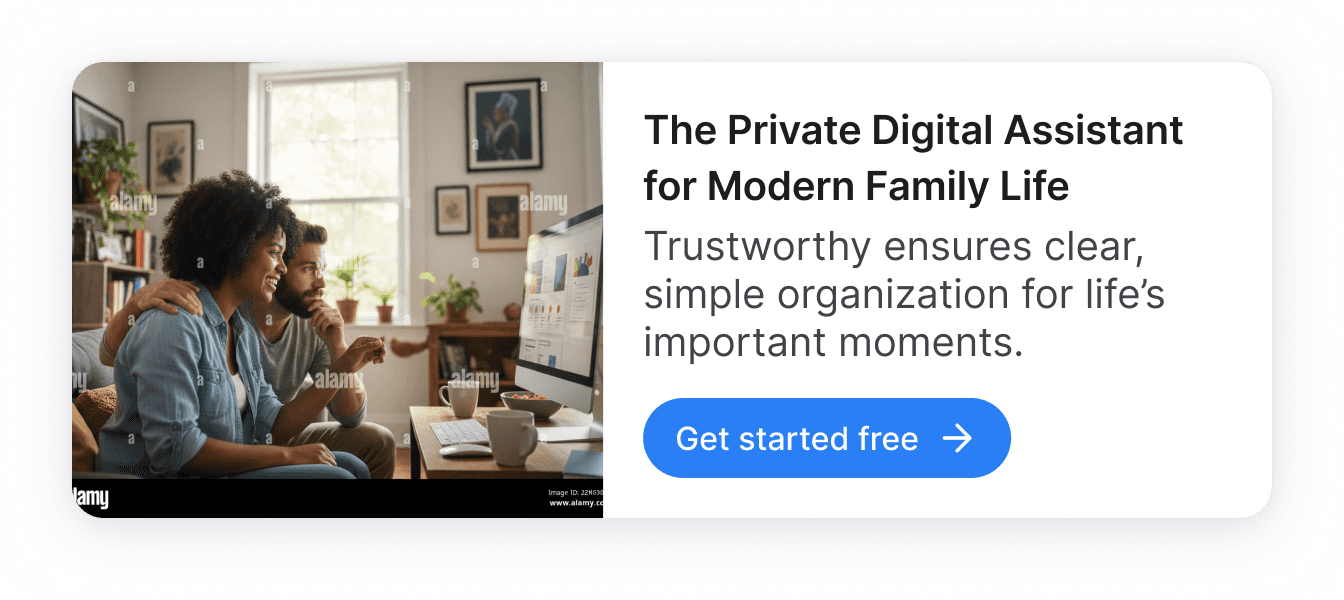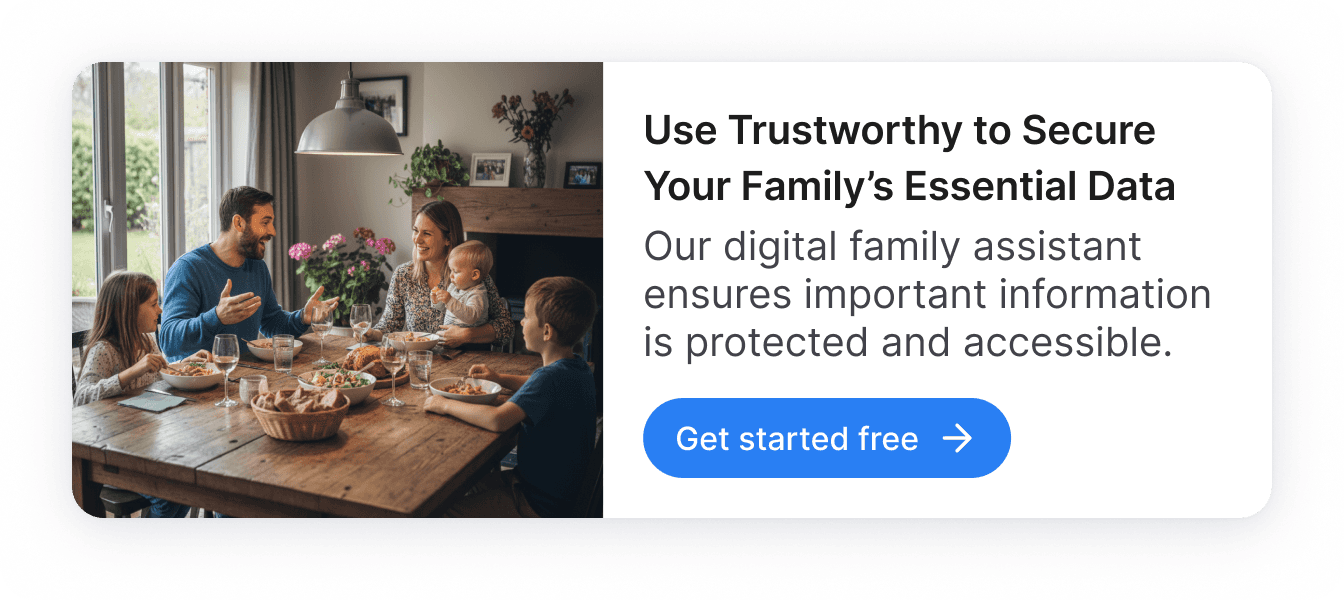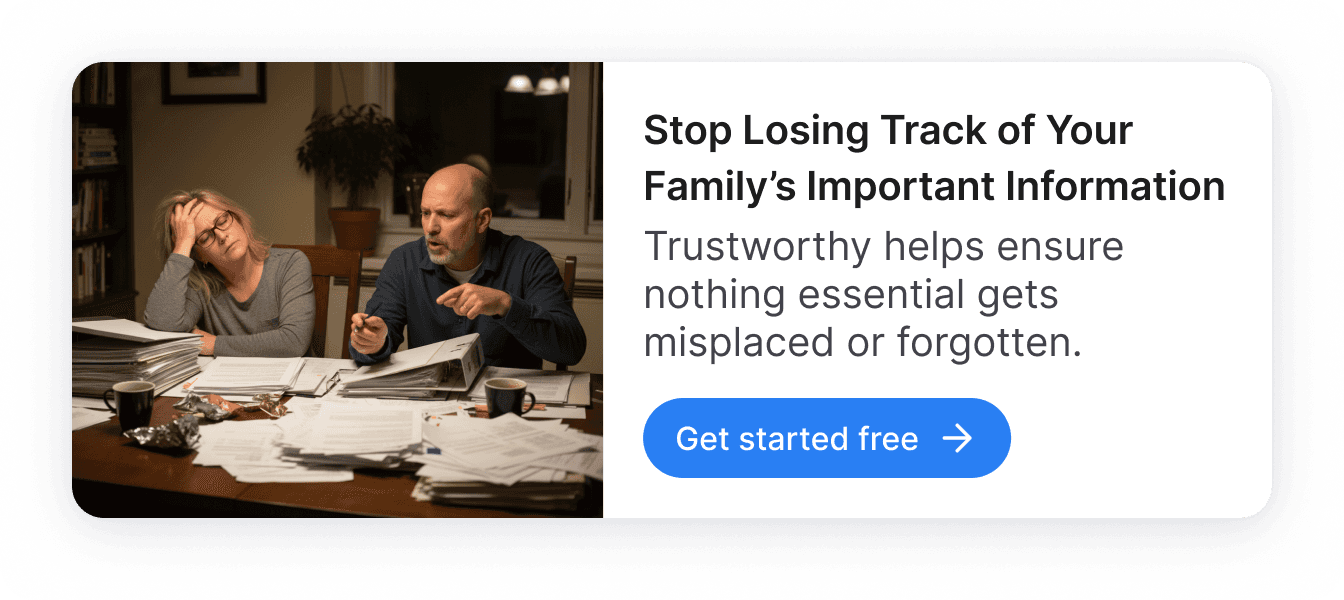What Changes When Your Child Turns 18 — and What Parents Still Need
|
Trustworthy
Trustworthy's digital family assistant keeps your important information secure, private, and accessible. Watch to learn more.
Key Takeaways
When a child turns 18, parents lose automatic access to medical and educational records.
Privacy laws apply regardless of financial dependence or continuing parental involvement.
Access can be restored only through explicit permissions or legal authorizations.
Many families are surprised by how immediate and restrictive this change is.

Turning 18 is a major milestone. It’s the age when a person legally becomes an adult in the eyes of the law, and with that comes a host of rights, responsibilities, and limitations — not only for them but for their parents, too.
If you're a parent, it may feel like things haven't changed all that much.
Your 18-year-old might still live at home, depend on you for financial support, or call you when something goes wrong. But legally, things are very different now.
This article walks you through what changes at 18, what access parents lose, and what steps you can take to ensure you’re still able to help your child when they need it.

What Changes Legally at Age 18?
Once your child turns 18, they become a legal adult — and that comes with significant legal implications, including:
Privacy rights kick in. Parents no longer have automatic access to medical, financial, or academic records. Even if you're paying the bills.
They can sign contracts. Your child can now sign legally binding agreements, like leases, employment contracts, and credit applications — and are fully responsible for them.
They can vote and serve on a jury. Civic duties and rights, such as voting in elections and being eligible for jury duty, begin at 18.
They can be sued (and sue). Your child now has the legal standing to be involved in civil suits, as a plaintiff or a defendant.
They’re subject to adult criminal laws. Mistakes that might have resulted in sealed juvenile records before will now follow them into adulthood.

What Parents Can No Longer Access Automatically
As a parent, your ability to step in and help your child in an emergency or manage routine matters becomes limited unless legal permissions are in place.
Here’s what you lose access to when your child turns 18:
Medical Records and Health Decisions
Under the Health Insurance Portability and Accountability Act (HIPAA), once your child turns 18, doctors can’t legally share your child’s medical information with you — even in an emergency — unless they have explicit consent.
If your child is unconscious, hospitalized, or otherwise unable to communicate, and there’s no prior authorization on file, you may be powerless to help.
What to do: Have your child sign a HIPAA release form and create a medical power of attorney form (also known as a healthcare proxy) naming you as the person authorized to make decisions on their behalf.
These forms can be stored in Trustworthy's digital vault to ensure you have immediate access to them in an emergency.

Academic Records (FERPA)
Once your child starts college, the Family Educational Rights and Privacy Act (FERPA) prevents schools from sharing grades, disciplinary records, or enrollment information — even if you're footing the bill.
What to do: Ask your child to complete a FERPA waiver or release form at their college or university — especially if you're paying the bills — allowing you access to academic records and communication with the registrar or faculty.
Banking and Financial Access
If your child has a bank account solely in their name, you’ll no longer have the ability to access funds, check balances, or pay bills on their behalf.
Even if you’ve set up joint accounts, your child’s credit cards or loans that are in their name alone are off-limits to you.
What to do:
Consider keeping a joint bank account for shared expenses or emergencies.
If you’re co-signing loans or credit cards, be clear on your responsibilities and how payments will be managed.
Encourage your child to grant you durable power of attorney for financial decisions, so you can help manage accounts if needed.

Being an Emergency Contact Isn't Enough
You might be listed as an emergency contact, but that doesn’t give you legal authority to make decisions or receive information.
In an emergency, authorities or institutions can reach out to you, but they may not be able to share specifics unless your child has given prior legal consent.
What to do:
Make sure you’ve completed all necessary legal documents before an emergency happens.
A Legal Checklist for Parents of 18-Year-Olds
Here’s a consolidated checklist of documents and permissions your child should consider signing once they turn 18:
HIPAA authorization: Gives you permission to speak to doctors and access health records.
Medical power of attorney: Allows you to make healthcare decisions if your child is incapacitated.
Advance directive: Communicates your child’s wishes for life-sustaining medical care.
FERPA waiver: Allows you to access academic records and communicate with schools.
Durable financial power of attorney: Lets you help with banking, taxes, and financial decisions.
Joint bank account (optional): Keeps emergency funds accessible to both you and your child.
Phone and account access: Ensure your child has shared important login credentials or uses a secure password manager you can access in an emergency.
When Should You Do This?
Ideally, within a few weeks of their 18th birthday — especially if they’re going away to college, taking a gap year abroad, joining the military, or even just living independently for the first time.
If your child resists, frame it not as an intrusion, but as a precaution: “This is to make sure we can help you if something happens, not to monitor your every move.”
Where to Store These Documents
Once signed, these documents need to be stored somewhere secure and private — but accessible. A digital vault like Trustworthy is a smart choice.
It lets families store, organize, and securely share medical powers of attorney, HIPAA releases, and other critical records. That way, if a situation arises, you won’t be scrambling to find paperwork or prove your authority.
Final Thoughts
Becoming an adult doesn’t mean your child won’t need you anymore — it just means the rules change. With a few simple steps and the right documents in place, you can continue to support your child through college, early adulthood, and beyond, legally and responsibly.
Preparing now means fewer delays, fewer frustrations, and faster support when it matters most.
Trustworthy offers a modern, secure way to manage your family’s important information. You can get started for free and invite your child to collaborate securely.
Because turning 18 should mean new opportunities — not unexpected roadblocks.
We’d love to hear from you! Feel free to email us with any questions, comments, or suggestions for future article topics.













